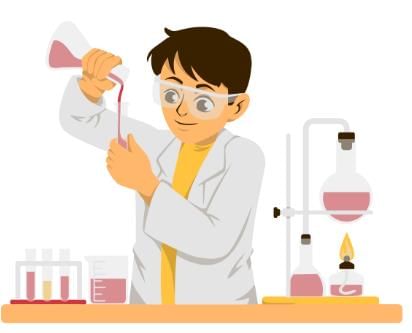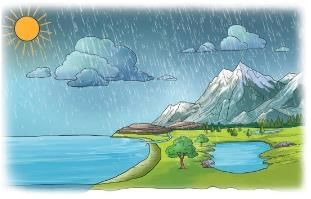Short Questions and Answers
Q1: What is the main goal of the science journey?
Ans: The main goal is to explore the world of science through curiosity, experiments, and asking deeper questions to understand the natural world and our place in it.
 Let your imagination take flightQ2: What is the process of scientific exploration?
Let your imagination take flightQ2: What is the process of scientific exploration?
Ans: Science is a process of discovery that involves questioning, experimenting, and learning from the patterns in nature. It encourages curiosity and hands-on activities.
Q3: How are light and shadows important in understanding the universe?
Ans: Light and shadows help us understand the movement of celestial bodies like the Earth and Moon, and phenomena like eclipses, day, and night, which are influenced by the Earth’s rotation and its orbit around the Sun.
Q4: What is the significance of conducting hands-on experiments in science?
Ans: Conducting hands-on experiments is significant because it allows students to directly engage with scientific concepts, test theories, and observe outcomes, fostering a deeper and more practical understanding of the material.
 ExperimentingQ5: Why is it important to ask questions in science?
ExperimentingQ5: Why is it important to ask questions in science?
Ans: Asking questions is essential because it leads to exploration, discovery, and deeper understanding. Great scientists often ask amazing questions that drive their research and findings.
Q6: How can we use science to address environmental challenges?
Ans: Science can help us understand environmental issues and offer solutions, such as addressing sustainability, reducing pollution, and conserving natural resources through responsible human actions.
 EnvironmentQ7: What does the textbook suggest about using experiments in science?
EnvironmentQ7: What does the textbook suggest about using experiments in science?
Ans: The textbook encourages conducting experiments to explore and test ideas, fostering a deeper understanding of concepts and the natural world. Experiments help scientists verify their theories and observe new phenomena.
Q8: What is the significance of time measurement in scientific exploration?
Ans: Time measurement is crucial in science as it helps in understanding the passage of time and the speed at which events occur, such as how fast something happens, which is important in studying various processes in nature.
Q9: How are the properties of materials explored in the textbook?
Ans: The textbook explores the properties of materials like malleability, ductility, and conductivity through activities and experiments to understand how different materials behave under various conditions.
 CircuitQ10: What can we learn from the design of paper planes, as mentioned in the text?
CircuitQ10: What can we learn from the design of paper planes, as mentioned in the text?
Ans: The design of paper planes inspired real scientific studies on flight and aerodynamics, showcasing how simple observations and experiments can lead to significant discoveries in science.
Long Questions and Answers
Q1: Explain the role of curiosity and experiments in scientific exploration.
Ans:
- Curiosity is the foundation of scientific exploration.
- The textbook encourages students to ask questions like "How do things work?" and "Why do events happen?"
- This curiosity drives experiments and hands-on activities that allow students to explore scientific concepts.
- By conducting experiments, students engage with the material directly, challenging their thinking and fostering a deeper understanding.
- These activities serve as stepping stones to more profound discoveries and help students see science as an ongoing process of learning.
Q2: Discuss the importance of interconnectedness between different scientific disciplines.
Ans:
- The textbook stresses that scientific fields are interconnected.
- Discoveries in one area often inspire new questions or breakthroughs in another.
- For example, understanding the principles of physics can lead to advancements in engineering and technology, while biological studies can inform ecological solutions.
- This interconnectedness allows students to see science as a holistic discipline, where advancements in one field can benefit others and provide comprehensive insights into the natural world.
Q3: How do light and shadows help us understand celestial phenomena?
Ans: Celestial Phenomena
Celestial Phenomena
- Light and shadows are fundamental in understanding celestial phenomena like day and night, as well as eclipses.
- The Earth’s rotation causes day and night by exposing different parts of the planet to sunlight.
- The phenomenon of eclipses occurs when the Earth and the Moon cast shadows due to their positions in relation to the Sun.
- By studying the movement of light and shadows, scientists can understand the patterns of celestial bodies and predict occurrences such as eclipses, further enhancing our knowledge of the universe.
Q4: What is the significance of scientific questioning in the process of discovery?
Ans:
- Asking questions is central to the process of discovery.
- Scientists don’t just focus on answering questions—they ask new ones that challenge existing knowledge and open up new avenues of research.
- This process of questioning leads to deeper understanding and helps in refining theories or discovering new phenomena.
- For example, the question “Why do things work the way they do?” leads to scientific inquiry, exploration, and ultimately, the expansion of knowledge.
Q5: Explain the role of time measurement and its importance in scientific experiments.
Ans:
- Time measurement is vital in scientific experiments because it helps in quantifying and comparing the duration and speed of different processes.
- Whether studying chemical reactions, the growth of plants, or the movement of celestial bodies, understanding time allows scientists to analyze how quickly or slowly something happens, providing essential data for their studies.
- Accurate timekeeping is also crucial in fields like physics and astronomy, where precise measurements are needed to test hypotheses and validate theories.























